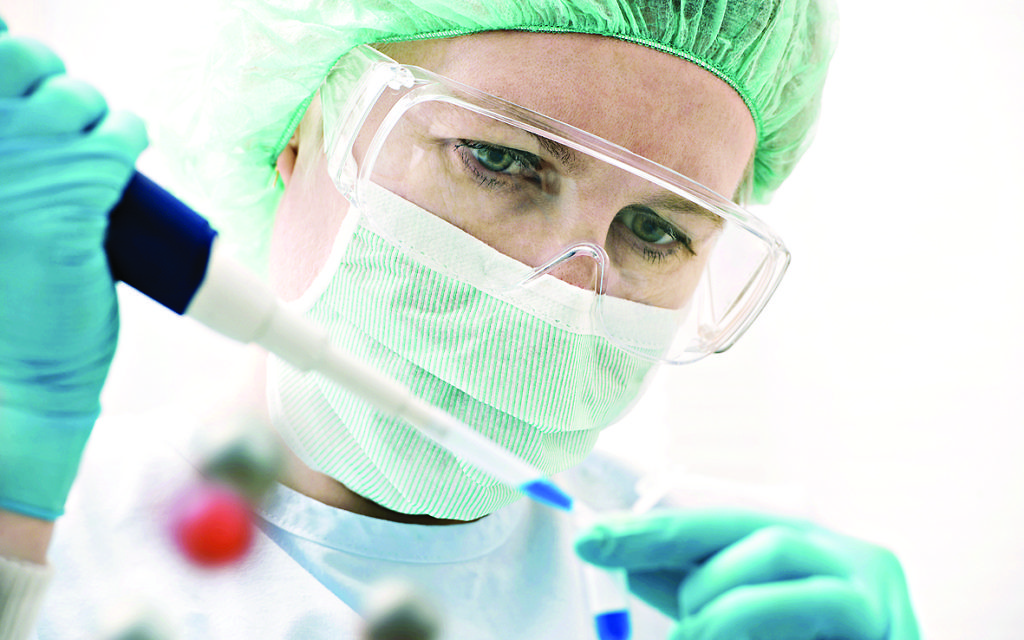SPECIAL REPORT: British-Israeli medical collaboration that’s healing the world
MORE THAN 300 British and Israeli scientists will meet in Oxford next week to broaden the already extensive medical collaboration between the countries. Stephen Oryszczuk previews a conference with mind-blowing possibilities for the treatment of conditions including heart disease, Parkinson’s, diabetes and Multiple Sclerosis.

You have a heart-attack. You survive. You recover – but not fully. Your heart has been irreparably weakened. It now has huge difficulty pumping blood around the body. Only a transplant will help, but donor hearts are incredibly rare. You need an alternative fix. Today, that fix could come from British-Israeli collaboration.
It’s happening as you read this. In one lab, an Oxford don and an expert from Rehovot are asking if proven cell repair work in mice could also work in humans. Professor Paul Riley knows how to stimulate the heart tissue to repair itself by growing new heart muscle cells, while Professor Eldad Tzahor from the Weizmann Institute knows how to grow large numbers of them. Theirs is an obvious match.
Get The Jewish News Daily Edition by email and never miss our top stories Free Sign Up
In another lab, Edinburgh’s Professor Bruno Peault and Technion’s Professor Joseph Itskovitz-Eldor think “spider-like cells that wrap around blood vessels” could hold the key. These little danglers talk to other cells with their finger-like extensions, and they too stimulate the regeneration of tissue. Could these be the best cells for the job?
Using stem cells to mend broken hearts is all very well, say some, but we know they can lead to heart rhythm problems in grafted tissue. Enter Professor Chris Denning (from Nottingham) and Professor Lior Gepstein (also at Technion), who have now stopped competing and started collaborating on pacemakers which control heart rhythm using light, rather than an electrical impulse. It’s promising stuff. Not only could they solve the rhythm problem, but they could also find new ways of growing heart cells from stem cells. This means newbies would be more likely to survive and function.
These are but three of the eight bilateral projects announced last year as part of the Britain Israel Research and Academic Exchange programme (BIRAX), a £10million initiative of the British Embassy and British Council. All use stem cells to tackle degenerative diseases. Alongside matters of the heart, scientists and researchers have their sights fixed on Parkinson’s, diabetes, liver disease and Multiple Sclerosis. The programme invests in pioneering work undertaken jointly by scientists in Britain and Israel, 300 of whom will meet in Oxford in early April to discuss the next three years’ work. This will focus on arthritis, cardiovascular disease, Type 1 Diabetes, and neurodegenerative conditions including Alzheimer’s, MS and Parkinson’s. Researchers were asked to apply for funding late last year. Now it’s decision time.
The money – for travel, equipment and teams – comes from the British Council, UJIA, the Pears Foundation and the Maurice and Vivienne Wohl Charitable Foundation, as well as from the British Heart Foundation, JDRF, the Multiple Sclerosis Society UK, Parkinson’s UK and the UK Stem Cell Foundation. The backing, however, comes from the highest levels of the British and Israeli governments. “There are some amazing things going on in science right now,” said David Quarrey, Britain’s ambassador to Israel, who is chairing the Oxford event.
He’s right. Over two days, the boffins will talk about mind-blowing possibilities in exotic fields like bioengineering, gene modified cells, immunotherapy, nanotechnology and epigenetics – heritable changes in gene expression (for example, how a mother’s exposure to stress can ‘epigenetically’ affect her future unborn child, and what we can do in its early development to reverse the impact).
“Every now and then a technology breakthrough in science holds promise for dramatic progress in disease therapy and cures,” says Professor Raymond Dwek, chairman of the UK-Israel Science Council, who was awarded a CBE in 2013 for helping to set it up.
The rewards could be immense. Take diabetes. In 20 years time, an estimated 600 million people around the world will have it. Diabetics don’t produce the insulin they need to turn glucose into energy, because their bodies’ immune systems attack the cells charged with doing so.
Those cells cannot easily be recreated, but geneticists at Manchester (led by Professor Neil Hanley) and Hebrew University (led by Professor Benjamin Glaser) know that they divide naturally in a rare genetic disease.
If they can work out how to replicate that, they could arm the pancreas with the weapons it needs.
Professor Susan Wong from Cardiff and Professor Gideon Gross from the Galilee are going at the same problem from a different angle. They’re using gene therapy to target harmful cells, while reducing those that attack insulin-producing cells. Between them, Brits and Israelis are attacking diabetes in a pincer movement.
It all bodes well for the future, and the third BIRAX conference in Oxford on 11-12 April is looking ahead, with an entire morning set aside for “student and young researcher symposiums” and a wide variety of networking sessions. The idea is to get scientists and would-be scientists from the two countries talking. One suspects one side may do more talking than the other.

Thank you for helping to make Jewish News the leading source of news and opinion for the UK Jewish community. Today we're asking for your invaluable help to continue putting our community first in everything we do.
For as little as £5 a month you can help sustain the vital work we do in celebrating and standing up for Jewish life in Britain.
Jewish News holds our community together and keeps us connected. Like a synagogue, it’s where people turn to feel part of something bigger. It also proudly shows the rest of Britain the vibrancy and rich culture of modern Jewish life.
You can make a quick and easy one-off or monthly contribution of £5, £10, £20 or any other sum you’re comfortable with.
100% of your donation will help us continue celebrating our community, in all its dynamic diversity...
Engaging
Being a community platform means so much more than producing a newspaper and website. One of our proudest roles is media partnering with our invaluable charities to amplify the outstanding work they do to help us all.
Celebrating
There’s no shortage of oys in the world but Jewish News takes every opportunity to celebrate the joys too, through projects like Night of Heroes, 40 Under 40 and other compelling countdowns that make the community kvell with pride.
Pioneering
In the first collaboration between media outlets from different faiths, Jewish News worked with British Muslim TV and Church Times to produce a list of young activists leading the way on interfaith understanding.
Campaigning
Royal Mail issued a stamp honouring Holocaust hero Sir Nicholas Winton after a Jewish News campaign attracted more than 100,000 backers. Jewish Newsalso produces special editions of the paper highlighting pressing issues including mental health and Holocaust remembrance.
Easy access
In an age when news is readily accessible, Jewish News provides high-quality content free online and offline, removing any financial barriers to connecting people.
Voice of our community to wider society
The Jewish News team regularly appears on TV, radio and on the pages of the national press to comment on stories about the Jewish community. Easy access to the paper on the streets of London also means Jewish News provides an invaluable window into the community for the country at large.
We hope you agree all this is worth preserving.
-
By Brigit Grant
-
By Laurent Vaughan - Senior Associate (Bishop & Sewell Solicitors)
-
By Laurent Vaughan - Senior Associate (Bishop & Sewell Solicitors)
-
By Laurent Vaughan - Senior Associate (Bishop & Sewell Solicitors)
-
By Laurent Vaughan - Senior Associate (Bishop & Sewell Solicitors)






















